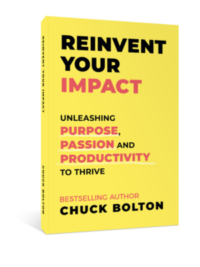What’s the #1 Thing a CEO Should Do to Create Clarity?
Define a clear company purpose. Operate by that purpose. Align and mobilize others to operate by purpose.
For individuals, your purpose is the overarching guiding principle that gives your life meaning. It’s your unique definitive statement about the difference you are trying to make in the world.
It’s no different for companies. Purpose is the company’s definitive statement it is trying to make in the world. It’s the secret ingredient of extraordinary companies. CEOs, business unit presidents and owners are well-served making their organization’s purpose front-and-center for all stakeholders.
 Why would you want to define your organization’s purpose? In challenging times, a statement of purpose can serve as your company’s rudder. Purpose makes decision-making easier, drives deeper employee and customer engagement along with more fulfillment and happiness. When it is clear, companies look at problems, opportunities and the world through the lens of their purpose. Having a clear purpose benefits your top team, your people, your customers, your ownership group and your other stakeholders, too.
Why would you want to define your organization’s purpose? In challenging times, a statement of purpose can serve as your company’s rudder. Purpose makes decision-making easier, drives deeper employee and customer engagement along with more fulfillment and happiness. When it is clear, companies look at problems, opportunities and the world through the lens of their purpose. Having a clear purpose benefits your top team, your people, your customers, your ownership group and your other stakeholders, too.
During the pandemic, your people, customers and others have likely felt adrift. Let your purpose serve as your North Star. A well-defined purpose grounds your stakeholders, enabling them to focus on issues and problems with a sense of hope and meaning. As businesses reconsider working arrangements and their roles in promoting diversity, equity and inclusion, these initiatives benefit from being tightly led and aligned with your company’s purpose.
No organization or company is too big or small, too young or old, or too specialized or too commoditized to have a purpose. Every company is capable of having a purpose – and should!
A well-defined purpose statement provides the following:
- A clear reason for being in business and serving – other than financial performance – that your people and other stakeholders can grab hold of today and in the future.
- The difference you are trying to make that betters the world.
Purpose is a path to high performance. Here are additional reasons a company should develop and operate by their unique purpose. Consider the proofs:
- Only 53% of employees feel their organizations were effective or very effective at creating meaningful work.[1]
- 70% of US adults say it is important to them that their actions help make a positive difference in the world.[2]
- Purpose is so important to people, 9 of 10 people are willing to earn less money to do more meaningful work. On average, the pool of American workers said they’d be willing to forego 23% of their entire future lifetime earnings in order to have a job that was always meaningful.[3]
- Companies with high levels of purpose outperform the market by 5-7%, grow faster and have higher profitability. [4]
- Studies have shown that stock values of purpose-driven organizations outperform others within the same space from 133 to 386%. The research of Jim Collins and Jerry Porras looked back to 1926 and found that purpose-driven companies performed 15 times better than the overall stock market since that time. [5]
- Companies that choose to put their employees and their customers first are outperforming conventional competitors (who have an eye almost exclusively on profit and shareholders) in stock market performance on the order of 8 to 1. [6]
A powerful purpose statement connects with the heart as well as the head. There should be an emotional, ethical and rational appeal that emanates from a well-defined purpose. It expresses your company’s impact on the lives of stakeholders – employees, customers, shareholders, suppliers, the community and the environment.
Some people get purpose mixed up with vision, mission and values. Purpose trumps vision and mission!
A purpose statement is the unique definitive state about the difference your company attempts to make in the world. A vision statement confirms what the company wishes to be like in the future. A mission statement describes what the business is here to do. The business the company is in. It’s objective is internal to provide a focus for leaders and tea members. Values describe how people are expected to behave and operate in pursuit of the vision and mission. While vision, mission and values are important, a firm’s purpose is key. Purpose steers the ship. Vision, mission and values may change over time, but a purpose never does.
Here are examples of company purpose statements:
Bosch: Invented for life, we want our products to spark enthusiasm, improve quality of life, and help conserve natural resources.
BMW: To enable people to experience the job of driving.
Charles Schwab: A relentless ally for the individual investor.
IAG: To help people manage risk and recover from the hardship of unexpected loss.
ING: Empowering people to stay a step ahead in life and business.
Kellogg: Nourishing families so they can flourish and thrive.
REA Group: To make the property process simple, efficient and stress free for people buying and selling a property.
Southwest Airlines: To give people the freedom to fly.
Wal-Mart: Save people money so they can live better.
To craft a purpose statement for your company, start asking questions. You’ll want to reflect on the reason for the company’s existence, who it benefits and the unique contribution it makes to the world.
Consider reflecting on and answering the following questions:
- Why does our company exist? Why was our company created?
- Why does our company do what we do in the here and now?
- What are the “jobs-to-be-done” we do for our customers/clients? What are the functional benefits of the “jobs-to-be-done” we do? What are the emotional benefits of these “jobs-to-be-done” we do? What is the ultimate value we create for our customer?
- Why is that important?
- What is unique about us?
- What is our “superpower” that allows us to make a distinctive contribution to the world?
- How do we operate when we’re at our best?
- If our company were no longer here, what would our customers/clients miss? What would other stakeholders miss?
Now it’s your turn to create your organization’s purpose statement. Gather your colleagues. Keep it to a sentence. Capture your firm’s uniqueness. Capture what you do that is a competitive advantage, without being too concrete or too abstract. Get started!
It may be useful to create several drafts with an expanded group of team members. What are the “red threads” of your company’s uniqueness that shine through? Can you find one purpose statement that makes your heart beat a little faster? That captures the essence of what your firm is all about? If you can’t, you’ve got more work to do. If you have, congratulations!
Now the challenging part begins. How will you bring that purpose statement to life? Having it on a poster on a wall or on a coffee cup doesn’t do it justice. Your people will need to internalize your purpose, and be able to recite it if you were to call them at 3 am (not suggesting this test). Once you’ve landed on your purpose, you will want to evaluate current company practices to see if they pass “the purpose test”, too. It should be used when tackling an issue where a decision must be made. Alternative choices should be weighed using the purpose. “If I choose option A, is that consistent with our purpose? How about if I choose option B?”
If you don’t have a defined purpose, you are missing a huge opportunity to lift up the performance of your people and company in so many areas. CEOs who take the time to clarify and operate by purpose don’t regret the decision. Leading by purpose makes work and life so much simpler.
In upcoming posts, I’ll share more ideas for bringing that purpose statement to life.
For more information on purpose, check out bestselling book, Reinvent Your Impact: Unleashing Purpose, Passion and Productivity to Thrive
[1] Deloitte Insights – 2019 Human Capital Trends – From Employee Experience to Human Experience: Putting Meaning Back to Work
[2] Gallup Workplace – What Millennials Want is Good for Your Business – Jennifer Robinson, March 22, 2019
[3] Shawn Achor, Andrew Reece, Gabriella Rosen Kellerman and Alexi Robichaux – Harvard Business Review, November 6, 2018
[4] Top CEOs Have Realized Companies Need a purpose Beyond Profit – Claudine Gartenberg and George Serafeim, Aug 20, 2019, Harvard Business Review
[5] Leading from Purpose: Clarity and the Confidence to Act When it Matter Most – Nick Craig
[6] It’s Not What You Sell, It’s What You Stand For: Why Every Extraordinary Business is Driven by Purpose – Roy Spence













Leave a Reply
Want to join the discussion?Feel free to contribute!